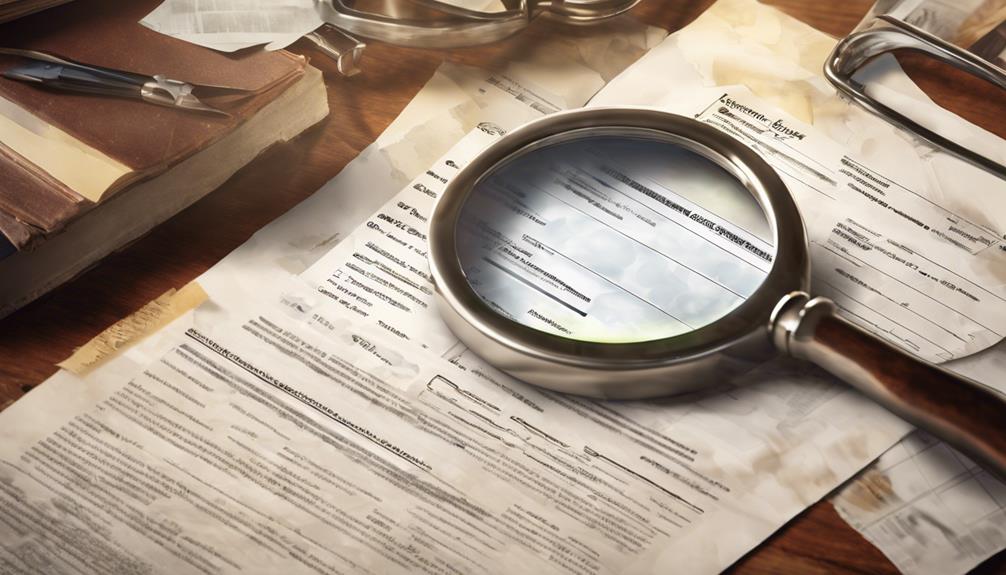Background checks for employment purposes do not affect credit scores; they are soft inquiries. Employers use them to gauge financial responsibility. While credit history will be reviewed, it won't harm credit. Job applicants need to grant permission and have protections under the Fair Credit Reporting Act. Background checks look at criminal, work, and credit information. If interested in learning more, further insights on types of checks and possible impact on job applications are available.
Key Takeaways
- Background checks for employment do not affect credit scores.
- Credit checks by employers are soft inquiries, not impacting credit.
- Applicants can decline credit checks, but it may impact their application.
- Some states restrict how employers use credit information.
- Employers seek financial responsibility insights without credit score impact.
Credit Check Vs. Credit Score

Employers distinguish between a credit check and a credit score to assess candidates' financial backgrounds effectively. A credit check involves a review of an individual's credit history, providing insight into their financial responsibility. On the other hand, a credit score is a numerical representation derived from this history.
When conducting pre-employment background checks, employers focus on the credit history rather than the score to evaluate an individual's financial stability. It's essential to mention that credit checks are considered soft inquiries and don't impact the credit score.
Information Seen in Credit Checks
Credit checks provide employers with detailed information regarding applicants' financial backgrounds. These checks reveal open lines of credit, outstanding balances, and payment history. Additionally, employers gain insight into any foreclosures, bankruptcies, or collection accounts that may be present.
The credit history displayed in these reports helps verify the identity, background, and financial responsibility of potential employees. While employers don't see applicants' credit scores through these checks, they do receive specific details about credit-related matters.
This thorough background information aids employers in making informed decisions when evaluating candidates for positions within their organizations. By having access to such detailed financial data, employers can better assess the risk associated with hiring a particular individual and guarantee that they're making sound choices for their company.
Impact on Credit Score

When examining the impact on one's credit score, it's important to understand that background checks, including credit checks, don't influence the credit score due to their categorization as soft inquiries. These soft inquiries, such as those made by potential employers as part of a job application process, don't impact your credit score.
Employers conducting financial checks or background screenings that involve credit checks can't affect your credit score. It's essential to note that credit checks by potential employers for purposes like evaluating your financial responsibility or checking for a criminal history are separate from traditional credit inquiries that may impact your credit score.
Essentially, while these background checks provide valuable information to the employer, they've no bearing on your credit score status. Soft inquiries, like those made for employment purposes, are solely for informational reasons and don't harm your credit score.
Legal Rights of Job Applicants
Understanding the Fair Credit Reporting Act provides job applicants with essential legal rights regarding background checks. When it comes to credit checks during the hiring process, there are specific rules in place to protect applicants. Here are three key points to keep in mind:
- Written Permission: Employers must obtain written consent from applicants before conducting credit checks. This guarantees transparency and allows applicants to be informed about the process.
- Right to Refuse: Job applicants have the right to decline credit checks; however, refusing may impact their job application process. Employers often use credit information as part of their decision-making process.
- Legal Restrictions: Some states have specific limitations on how employers can use credit information in hiring decisions. It's crucial for both applicants and employers to be aware of these regulations to ensure compliance with the law.
Factors in Background Checks

Job applicants undergoing background checks can expect a thorough examination of their criminal history, work experience, and other pertinent details. These background checks typically focus on criminal background checks, work history, and credit-related information, which may include financial history but not credit scores. Background checks are considered soft inquiries when conducted for employment purposes, meaning they don't impact credit scores.
Employers conducting background checks don't have access to an individual's credit score or see other soft inquiries on their credit report. Consequently, job seekers can rest assured that their credit score remains unaffected by background checks for employment purposes. By delving into an individual's criminal history, work experience, and financial background, employers aim to make informed hiring decisions without compromising the applicant's credit score.
Background Check Impact on Credit Score
Employment-related background checks, including credit inquiries, have no direct influence on an individual's credit score. When employers conduct credit checks as part of background screenings, it's viewed as a soft inquiry, which doesn't impact credit scores.
Here are three key points to ponder regarding the relationship between background checks and credit scores:
- Focus on Credit History: Employers primarily look at an individual's credit history details rather than the credit score itself when carrying out background checks.
- No Impact on Credit Score: Credit scores remain unaffected by employment inquiries for background checks, ensuring that individuals' credit scores are preserved during the hiring process.
- Inclusion in Credit Reports: Soft inquiries related to employment background checks can be seen by individuals on their credit reports, allowing them to monitor any such activities without worry for credit score repercussions.
Types of Background Checks

Employment-related credit checks are soft inquiries that don't affect credit scores.
Criminal background checks focus solely on a person's criminal history, without involving credit information.
Different types of background checks, such as landlord and financial institution checks, have varying focuses on rental history, criminal records, eviction history, and credit behavior.
Credit Check Implications
Credit checks in background screenings provide valuable insights into an individual's financial history and responsibility. Employers often use credit checks as part of pre-employment screenings to assess a candidate's financial stability and reliability. These credit checks focus on various aspects, such as credit accounts, balances, and payment history.
Here are three key implications of credit checks in background screenings:
- Soft Inquiries: Credit checks conducted by employers are typically classified as soft inquiries, meaning they don't impact an individual's credit score.
- Financial History Evaluation: Employers use credit checks to explore an applicant's financial history, including their credit accounts and past payment behavior.
- Assessment of Financial Stability: By examining an individual's credit information, employers can measure their financial stability and reliability, aiding them in making informed hiring decisions.
Credit Impact Assessment
Soft inquiries from background screenings typically don't impact an individual's credit score. Employers conducting credit checks as part of background screenings focus on evaluating financial responsibility and history rather than affecting credit scores.
These credit checks are considered soft inquiries, which don't have a negative impact on credit reports. When employers request credit information during background checks, they don't have access to view other soft inquiries on an individual's credit report.
It's important for individuals to be aware that soft inquiries, including those from employer-requested credit checks, can be visible on their credit reports. Refusing credit checks in pre-employment screenings may raise concerns for employers, especially in industries where financial responsibility is a key factor.
Understanding the purpose and implications of credit checks in background screenings can help individuals navigate the process with confidence and transparency.
Additional Background Check Methods
Fingerprint checks provide detailed criminal history information, offering a thorough method for conducting background checks. In addition to traditional methods like credit checks and public records searches, there are other valuable tools employers can use to gather information on potential job candidates.
Three additional background check methods include:
- E-Verify System: This system allows employers to confirm the eligibility of individuals to work in the United States. It helps secure that job candidates are legally authorized to work, adding an extra layer of security to the hiring process.
- Social Media Screening: Employers may choose to review applicants' social media profiles to gain insights into their behavior, character, and professionalism. While this method has some ethical considerations, it can offer valuable information beyond what traditional background checks provide.
- Reference Checks: Contacting a candidate's previous employers or personal references can offer valuable insights into their work ethic, skills, and character. This method helps verify the accuracy of the information provided by the candidate and can give employers a well-rounded view of the individual.
Frequently Asked Questions
Does a Background Check Affect My Credit?
A background check, including a credit check, does not impact one's credit score. Employers may review credit history for financial responsibility assessment, but this does not affect the score directly. Soft inquiries for background checks do not harm credit.
Can a Criminal Record Affect Your Credit Score?
A criminal record does not directly impact a person's credit score. Credit scores are determined by financial behaviors, not criminal history. Employers typically focus on credit history, not criminal records, during pre-employment checks.
Is a Background Check a Hard Inquiry?
A background check is not a hard inquiry. It is a soft inquiry that does not impact credit scores. Employers conducting background checks do not have access to credit scores and focus on verifying information for employment suitability.
Can You Be Denied a Job Because of Bad Credit?
Bad credit may impact job prospects as employers review credit history for financial roles. While not always disqualifying, it can raise concerns. Negative items like bankruptcies and collections could influence hiring decisions for certain positions.
Conclusion
To sum up, it's essential to remember that while background checks may not directly impact your credit score, they can still play a role in your overall financial well-being.
As the saying goes, 'knowledge is power' so it's vital to understand what information is being accessed during these checks and how it may affect your future opportunities.
Stay informed and proactive to guarantee your financial health remains intact.









